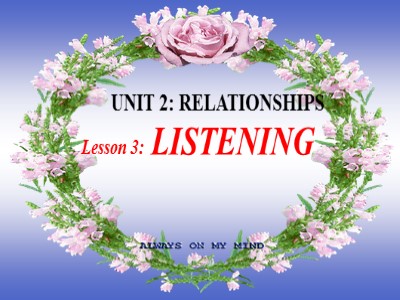Bài giảng Tiếng Anh 11 - Unit 2: Relationships - Lesson 3: Listening

psychologist /sai'kɒlədʒist/ (n)
guest speaker (n)
oppose (v) /əˈpoʊz/
break-ups (n)
broken hearts (n)
a shoulder to cry on
suffer (+from) (v)
respectful /ri'spektfl/ (adj)
Bạn đang xem tài liệu "Bài giảng Tiếng Anh 11 - Unit 2: Relationships - Lesson 3: Listening", để tải tài liệu gốc về máy bạn click vào nút DOWNLOAD ở trên
UNIT 2: RELATIONSHIPS Lesson 3: LISTENINGActivity 1. If you have a boyfriend or girlfriend, will you tell your parents about it ? Why or why not? guest speaker (n)oppose (v) /əˈpoʊz/break-ups (n)broken hearts (n)a shoulder to cry onpsychologist /sai'kɒlədʒist/ (n)khách mờinhà tâm lý họcphản đốisự đổ vỡ, chia taycõi lòng tan nátbờ vai để nương tựasuffer (+from) (v)chịu đựngrespectful /ri'spektfl/ (adj) biết tôn trọngActivity 2: Listen and choose the best answer: 1. From __________ years of age, many teenagers spend a lot of time thinking or talking about being in a relationship. A. 10 to 12 B. 13 to 14 C. 15 to 192. Young people may feel more _______ to talk about their relationships in the future if they openly discuss feelings and friendships with their parents. A. Enthusiastic B. confident C. upset3. Most parents are willing to _________. A. talk to a psychologist B. talk about romantic relationships C. lend a sympathetic ear to their children4. Dr Dawson`s last advice to teenagers is that they should _________ . A. respect their parents’ views B. be friends with their parents C. not get too anxious about break-ups2. Listen to the talk show with host Vicky Holmes and guest speaker Dr Dawson. Choose the best answer to complete each statement.Activity 3: Listen again. Fill in the blankrelationshipsbreak-upslifecryfeelingsteenagersfriendsadviceVicky: Dr Dawson, most are worried about their children getting involved in romantic (1)__________. What's your opinion on this?Dr Dawson: From 15 to 19 years of age, many (2)__________ spend a lot of time thinking or talking about being in a relationship.Vicky: So do you mean this is part of the teen normal growth and development?Dr Dawson: Yes. Young people learn how to form safe and healthy relationships with, (3)______, parents, teachers and romantic partners. This can prepare them for adult (4)_____. So parents should not oppose their relationships.Vicky: I suppose many parents will feel surprised to hear this. What's your (5) _______ for the teenagers then?Dr Dawson: Well, they should not be afraid to talk to their parents about their (6)_______ and friendships. This can help them feel confident to discuss their relationships in the future.Vicky: So you mean teenagers should listen to their parents and ask them to listen to what they are saying?Dr Dawson: Exactly. Most parents are always willing to lend an ear to what their children are saying. This is even more important when young people suffer (7)__________or broken hearts. They need a shoulder to (8) ____ on and a sympathetic earrelationshipsteenagersfriendslifeadvicefeelingsbreak-upscryThanks for Attention
Tài liệu đính kèm:
 bai_giang_tieng_anh_11_unit_2_relationships_lesson_3_listeni.ppt
bai_giang_tieng_anh_11_unit_2_relationships_lesson_3_listeni.ppt



